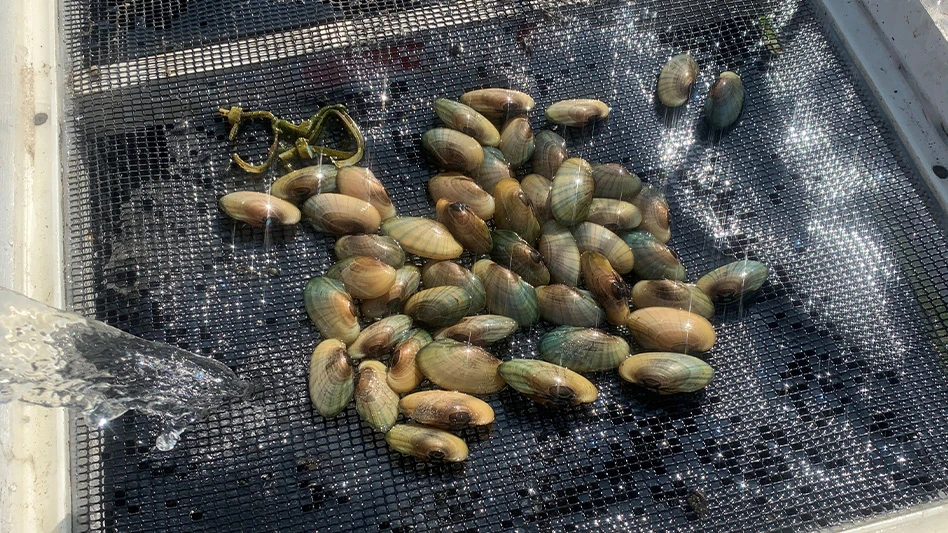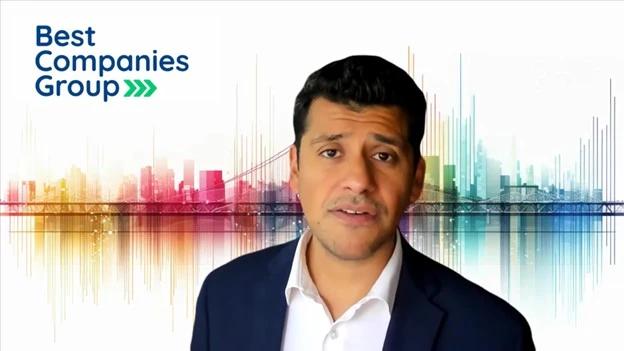
Courtesy of TPC Deere Run (2)
Over the past three years, TPC Deere Run in Silvis, Illinois, has been breeding mussels in the club’s irrigation lake, where it has now made a significant impact on the regional waterways. Before the project began, director, international and TPC agronomy for the PGA Tour Alex Stuedemann and the team began reaching out, looking to get involved in the community.
The agronomy team participated on a local conservation board, where “We would get together with other vested entities, whether that be energy providers or landowners, farmers, municipalities, so on and so forth, to discuss things that were working well in our operations,” says Stuedemann, who moved into his current position in 2022 after leading TPC Deere Run’s golf maintenance team for nine years. “Best management practices as well as looking at future opportunities where we can get better.”
The agronomy team presented “what we do for our irrigation practices and water conservation,” Stuedemann says. They met a local wildlife and fisheries team from one of the local energy providers where they discussed what they did in managing the watershed. The idea of breeding beneficial mussels was conceived.
Mussels have an important ecological role. They keep waters clean by filtering out harmful algae and bacteria. Not only that, but “Mussels improve the clarity of water by removing total dissolved solids and other sediments that can cloud waters, whether that be around swimming areas or in their case, areas that may benefit their plants,” Stuedemann says.
Mussels are also an indicator of water pollution. While mussels filter out pollution, they can only handle so much. If waters are too polluted, the mussels will die as they cannot escape polluted waters. Alongside helping the water, they provide a food source for various animals.
Having little knowledge of mussels at the time, Exelon Energy, now called Constellation, sent their biologist Jeremiah Haas to TPC Deere Run. “We walked our lake, getting to learn that there are so many different species that reside in our area and how they all can be beneficial,” Stuedemann says. “And just trying to determine those species that would best grow and exist in our lake here at the golf course.”

With testing of the water quality already being done on a routine basis at TPC Deere Run, the team reported things like pH levels, the total number of dissolved solids in the water, and the combination of well and river water in the lake. The biologists then determined what species best fit into the water.
The biologists then installed the breeding canisters using a wooden pallet and plastic totes from the hardware store. Solar-powered aerators were also installed in the irrigation lake. “And then they're all assembled, and the young mussels are placed in there to grow in our ponds, and they're monitored typically on a monthly basis,” Stuedemann says.
Apart from losing some of the stock after a couple pallets were flipped over due to strong winds from a derecho storm event, the breeding has been a success. Constellation even transported 1,800 new mussels from the lake, in just a single summer, to two areas along the Mississippi River watershed.
Among the mussels, Stuedemann and the team have been doing other wildlife initiatives at other courses like leaving brush piles for habitats in the woods, constructing bird houses and fostering bees. “We've got one of our clubs that just installed six beehives to not only fill the population of beneficial pollinators, but also they're producing their own honey for their food beverage departments,” Stuedemann says.
Stuedemann and the team continue to look at ways where they can do the best in the environment.
“We’re not doing this for notoriety,” Stuedemann says. “We’re not doing this to say ‘yay, here, look what we’re doing.’ We’re doing it because we're caretakers of land. And especially at this property, we're caretakers of land that belong to the family of John Deere. We are a community fixture, we are a part of the fabric that makes up the Quad Cities and the only way to enjoy what this earth has given us is to take care of it and do it in the right ways.”
Stuedemann encourages golf course managers/superintendents to do something to help out the environment. “No thing is too small to undertake,” he says. “Every little thing that we can do as golf course managers, environmental stewards, will add up over time.”
Jacob Hansen is a Kent State University senior participating in Golf Course Industry’s summer internship program.
Latest from Golf Course Industry
- USGA focuses on inclusion, sustainability in 2024
- Greens with Envy 65: Carolina on our mind
- Five Iron Golf expands into Minnesota
- Global sports group 54 invests in Turfgrass
- Hawaii's Mauna Kea Golf Course announces reopening
- Georgia GCSA honors superintendent of the year
- Reel Turf Techs: Alex Tessman
- Advanced Turf Solutions acquires Atlantic Golf and Turf





